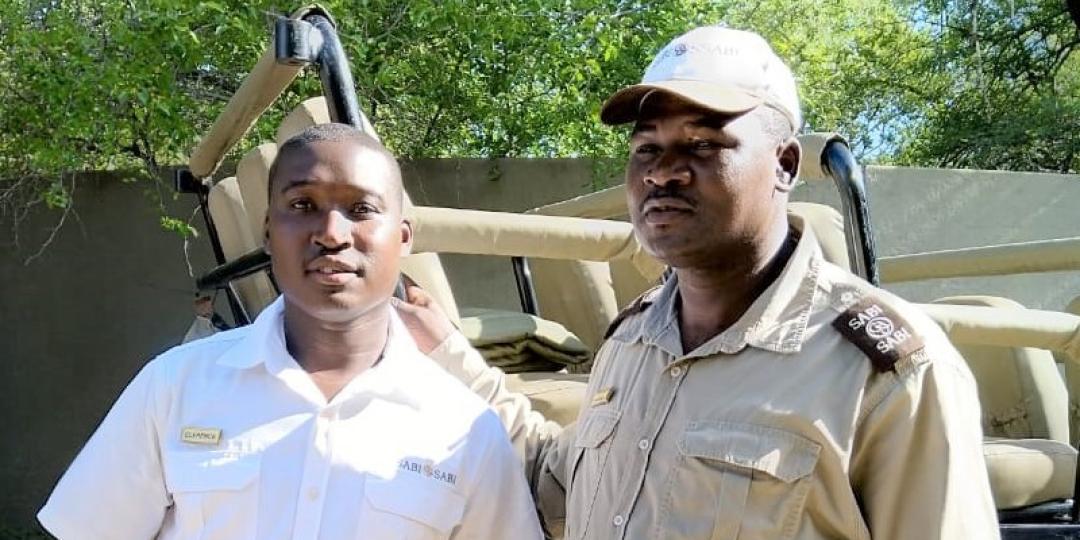Community Liaison for the Sabi Sabi Private Game Reserve, Clerence Mkansi has fond memories of the privately owned reserve when he was growing up. His father, Phios Mkansi, is one of Sabi Sabi’s top trackers and has worked for the company for over 30 years, starting out as a waiter and later pursuing his passion for wildlife, to become a tracker.
Sabi Sabi continues to be the background for his family’s inter-generational story.
“This company has been the main source of employment for two generations in my family,” explains Mkansi. “My uncle, Lawrence Mkansi, has been with the same company for more than 20 years. He is the Bush Lodge Assistant Manager/Guest Relations Manager. And then there are my two aunts, Lindiwe and Petunia Mkansi, both of whom work in front of house as waitresses at Selati Camp and Bush Lodge respectively.”
Mkansi was born in Huntington Trust, a village close to Bush Lodge (the first of the Sabi Sabi lodges, established some 40 years ago) and he has fond memories of visiting Sabi Sabi during his school holidays.
He takes his position as community liaison very seriously – fostering good relationships between the local community and the lodges and working on projects and initiatives that underline Sabi Sabi’s commitment to sustainability and community upliftment.
Like everyone in the hospitality industry, Mkansi says the team at Sabi Sabi are having a very difficult time during the COVID-19 lockdown, with no revenue coming in, putting huge strain on every aspect of the business and resulting in major financial loss.
Financial ripple affects communities
“This financial ripple spreads into the wider communities – the schools, the shop owners, the entrepreneurs – and the effect on these people, both physically and emotionally, has been huge,” says Mkansi. “The ripple of lockdown goes even further. The local and international tourists who visit Sabi Sabi are very generous in their support of the Sabi Sabi Foundation and, with no tourists, our ability to provide help has been somewhat reduced.”
He says the foundation is doing very important work, but times are trying, and the current situation makes Mkansi and his team feel totally powerless.
“The foundation is so important to me and we feel powerless to do anything. The government shutdown puts the situation out of our control, and while I understand there is a need to protect our people from the virus, for me, the need to keep the economy healthy is even greater.”
As someone who has experienced the benefits of tourism first-hand, Mkansi points out that it is one of the biggest contributors to our economy. He says most people just see it benefiting the lodges and their employees, but don’t understand how much it contributes to youth development and employment.
“Since I started working at Sabi Sabi, it has become clearer to me how much tourism impacts our neighbouring communities.”
About 80% of the people living around us depend on tourism to put food on the table and, without our guests, our community members are struggling to meet basic necessities – a matter that is highlighted in the cold winter months.”
Making ends meet is a challenge
Mkansi points out that since the outbreak of the pandemic earlier this year, life has become very difficult for him and many families who depend on the tourism industry to make ends meet.
“Even more affected are the orphans and the homeless, who depend on the funds received from our guests through the community tours that we run daily.”
He says that while there is a spirit of community, and everyone does what they can to help each other, the aid that people are receiving from government is simply not enough. He really believes that it’s time to open up leisure travel and the borders to allow international travellers to visit the country again. He insists that Sabi Sabi has all the right protocols in place to protect the safety of both staff and visitors.
“I really believe it is important for the international borders to open up so we can resume operations if we are to make sure the most vulnerable people in our communities are looked after. This needs to happen as soon as possible.”
























